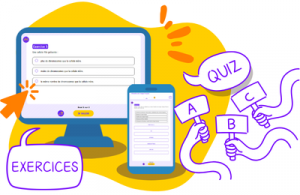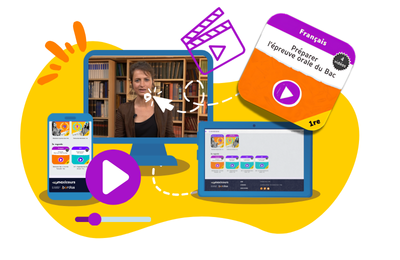The Family
- Fiche de cours
- Quiz et exercices
- Vidéos et podcasts
Découvrir un aspect de la notion « Vivre entre générations »
- Il existe 6 types de familles (nucléaire, étendue, à enfant unique, sans enfant, monoparentale et reconstituée).
- En 60 ans, la place de la femme a évolué sur le marché du travail. Auparavant mères au foyer, les femmes sont maintenant diplômées et participent au financièrement de la famille, ce qui engendre à un changement dans le cadre familial.
- L’augmentation du nombre de divorces ces dernières années changent radicalement la famille de type nucléaire. Cet accroissement est dû à l’allongement de la vie, à la baisse du poids de la religion dans la société, etc.
- La relation entre parents et enfants a également fortement changé. Les deux parents participent à l’éducation et le rapport entre eux est passé de l’autoritarisme à la complicité.
Unlike in the past when there was one or two types of families, the latter have multiplied. It was then quite simple to define the family unit. People got married, had children and lived together until the end of their lives. It is no longer the case. Indeed, nowadays we can count up to six types of families.
In the nuclear family, parents and children live together. Either one parent works or both parents work. It is the most common type of family in North America.
In an extended family, not only parents and children live under the same roof but also grandparents, uncles, aunts, etc. Most of these families can be found in Southern Europe, Asia, the Middle East, Africa and Latin America.
In a single child family, the parents have chosen to have only one child. Even though many people think that the child is spoilt, no study confirms this idea.
For different reasons some couples choose not to have any children at all, either because they want to have more free time or because of financial reasons. Others do not want to have a baby, because they think their child will grow in a “bad” world, a world where wars, diseases and corruption predominate. They may also tell you that there are too many inhabitants on our planet. The reasons are so numerous…
Because of the increasing number of divorces or because of premature death, some children do not have two parents, but only one.
Again, because of divorces which become more and
more frequent, parents remarry (or decide to
live together without being married) and reconstitute a
family.
This type of family has advantages and drawbacks: the
children have two families instead of one, so they can
have more presents at Christmas or on their birthday
for instance, but they can find it difficult to adapt
to a new situation.
This kind of situation can be hard for the parents too,
especially if they do not have custody of their
children or if they see them too occasionally.
In the 1960s mothers had children at a younger age than today. The difference between a mother and her first child was on average 25 years. Now, they keep studying later, because the more and higher diplomas they get, better the job is, and most of the time they do not have a baby before they are 30.
Contrary to their grandmothers who stayed at home and
raised their children, women want to follow the tracks
of their mothers who wanted to work and show that they
could be as able as men in every sector of the economy.
They wished their statute would change and they needed
recognition from the men’s community. They had to
fight hard for it and even though some inequalities
still exist (wages, positions, etc.) we can say
that their condition has improved.
This change of mentality is normal. Why should
they stay at home if they want to work? Why should they
not be as independent as their husband? It is all the
more normal as life is getting more and more expensive.
So two salaries instead of one is not to be neglected.
What has changed too is that today people dare to
divorce if things go wrong between them. Society has
changed to such an extent that relations between people
have evolved, too. And this favours separations.
People live longer, do not work for the same company as
long as they used to, so they get more opportunities to
meet people than in the past. They do not feel
concerned with religious observances anymore, they are
aware that a lot of marriages will end up in
divorces… In the past, couples stayed together
because it was badly perceived by one’s family or
friends to separate from one’s spouse. Was it
better or worse?
Well, it is difficult to judge whether the situation is
better or worse today, but what we can say is that it
is different. Look at the relations between parents and
children nowadays. They have improved a lot.
The parents are closer to their children than they used
to be. They play or spend more time with them, and
parents and children, living together or not, often
share the same hobbies.
If considerable changes have occurred in the last 60 years as far as family life is concerned, our societies (work, relations between people, private and public life, etc.) have been modified, too. Both are closely linked, aren’t they?

Des quiz et exercices pour mieux assimiler sa leçon
La plateforme de soutien scolaire en ligne myMaxicours propose des quiz et exercices en accompagnement de chaque fiche de cours. Les exercices permettent de vérifier si la leçon est bien comprise ou s’il reste encore des notions à revoir.

Des exercices variés pour ne pas s’ennuyer
Les exercices se déclinent sous toutes leurs formes sur myMaxicours ! Selon la matière et la classe étudiées, retrouvez des dictées, des mots à relier ou encore des phrases à compléter, mais aussi des textes à trous et bien d’autres formats !
Dans les classes de primaire, l’accent est mis sur des exercices illustrés très ludiques pour motiver les plus jeunes.

Des quiz pour une évaluation en direct
Les quiz et exercices permettent d’avoir un retour immédiat sur la bonne compréhension du cours. Une fois toutes les réponses communiquées, le résultat s’affiche à l’écran et permet à l’élève de se situer immédiatement.
myMaxicours offre des solutions efficaces de révision grâce aux fiches de cours et aux exercices associés. L’élève se rassure pour le prochain examen en testant ses connaissances au préalable.

Des vidéos et des podcasts pour apprendre différemment
Certains élèves ont une mémoire visuelle quand d’autres ont plutôt une mémoire auditive. myMaxicours s’adapte à tous les enfants et adolescents pour leur proposer un apprentissage serein et efficace.
Découvrez de nombreuses vidéos et podcasts en complément des fiches de cours et des exercices pour une année scolaire au top !

Des podcasts pour les révisions
La plateforme de soutien scolaire en ligne myMaxicours propose des podcasts de révision pour toutes les classes à examen : troisième, première et terminale.
Les ados peuvent écouter les différents cours afin de mieux les mémoriser en préparation de leurs examens. Des fiches de cours de différentes matières sont disponibles en podcasts ainsi qu’une préparation au grand oral avec de nombreux conseils pratiques.

Des vidéos de cours pour comprendre en image
Des vidéos de cours illustrent les notions principales à retenir et complètent les fiches de cours. De quoi réviser sa prochaine évaluation ou son prochain examen en toute confiance !









